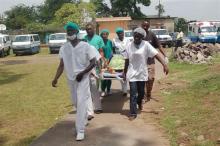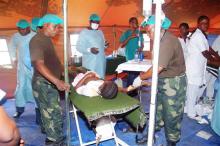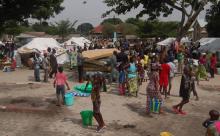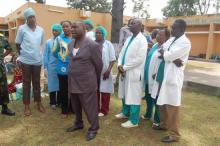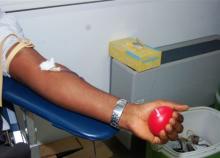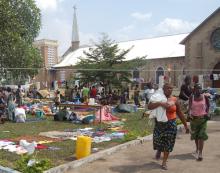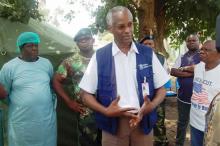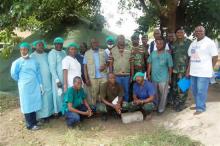Explosions in Brazzaville: United Nations system stands shoulder to shoulder with the Congolese people
Brazzaville 8 March 2012 – Agencies of the United Nations system are working hard to support the Government in dealing with the disaster that claimed many human lives and led to the destruction of houses and an influx of displaced persons following explosions in the ammunitions depot of the Congolese Armed Forces, last Sunday, 4 March 2012, in Mpila suburb in Brazzaville.
This response, which was provided in diverse forms, took shape in the immediate aftermath of the disaster and is being strengthened, as and when needs are better identified. At the strategic level, few hours after the explosion, the UN Resident Coordinator, chaired the first humanitarian coordination meeting jointly with Mrs Emilienne Raoul, Minister of Social Affairs, Humanitarian Action and Solidarity. The next day, another meeting was held, this time including partners and humanitarian actors. In addition, humanitarian coordination meetings are organized, on a daily basis, by the UN agencies.
In the area of health, in the very evening of Sunday, WHO provided two tons of inputs (three comprehensive surgical kits), coordinated blood donations by United Nations staff and sponsored the stay of a 41-member team of emergency surgical operation doctors arriving in Brazzaville from the Democratic Republic of the Congo (DRC). This team set up a field hospital in one of the hospitals of Brazzaville and started performing major operations in addition to providing care for people who sustained minor injuries. There have no case of death recorded in this hospital since the arrival of the team.
For its part, the World Food Programme has started on-site distribution of food items and 3600 people have so far been supplied with rice, green peas, oil and salt. The food distribution will continue during coming days among wounded people on admission in hospitals. A six-month emergency programme is being developed to provide assistance for displaced persons and the host families. Staff will be assigned to help strengthen the stocks management capacity of the Ministry of Social Affairs, Humanitarian Action and Solidarity.
UNICEF has mobilized and briefed trauma counselling teams to establish case reporting and psychosocial support units as well as mechanisms for protection of unaccompanied children. UNICEF has also started constructing temporary latrines on sites at the Nkombo market and the Sacred Heart Cathedral where manufactured urinals (capacity of 103 m3) as well as garbage bins have been installed. UNICEF has started distributing non-food items (blankets, soap, mats, cooking kits) for about 130 families on two sites. It has also provided 10 medical kits, 2 complementary kits and 1 kit 3 (medical equipment). In coordination with its partners, UNICEF plans to provide response mainly in the sectors of Water, Health and Protection.
UNFPA has provided two ambulances and is taking measures to support pregnant women by supplying them with delivery kits while displaced women and young girls of child-bearing age have been given clothes, sanitary towels and women's sanitary products. Four hundred kits of sanitary pads will be delivered immediately while 2600 others will be supplied subsequently. UNFPA is in readiness to provide equipment and experts for computerized registration and profiling of displaced persons and will ensure that displaced pregnant women are monitored. The UNFPA assistance amounts to 110 million CFA Francs.
In the immediate aftermath of the disaster, UNDP provided support estimated at US$ 5000 to help address the consequences of the tragedy. This support included the release, in the evening of that Sunday, of its boat to transport medical supplies and care-providers from DRC to Brazzaville. Starting from Tuesday, UNDP made available the security expertise of the United Nations Mine Action Service (UNMAS) specialized in mine detonation and clearance, and the expertise of the United Nations Disaster Assessment Coordination (UNDAC) to strengthen the search for victims that were still under the rubble and to assess the related environmental impact. In addition, it supplied water for the stricken population and allocated resources to support blood donation operations.
The High Commission for Refugees (HCR) delivered non-food items to the Ministry of Social Affairs. These were mosquito nets, mats, mattresses, soap, jerrycans, tents and cooking kits. In addition to this donation estimated at US$ 20 000, HCR is providing technical assistance in management of sites (support, supervision, coordination) and case registration.
The United Nations system will mobilize emergency funds through the UN mechanism up to US$ 10 million and will continue to work closely with partners and humanitarian actors. The United Nations appreciates the quality of cooperation with the Government and the close collaboration with technical and financial partners as well as all humanitarian actors involved in managing this disaster.
It would be recalled that on Tuesday, 6 March 2012, the Resident Coordinator and Heads of agencies of the United Nations system, together with the Chargé d'Affaires ad. interim of the Embassy of USA and Congolese President's Adviser on the United Nations systems visited the different sites hosting displaced persons. These visits made it possible to give a message of solidarity to the displaced persons and to assess their needs. The outcomes of these needs assessments will enable the United Nations system to better target and increase its assistance to the populations and provide medium-term support to the Government in reconstruction and rehabilitation and to support early recovery interventions.
CENTRE D'INFORMATION DES NATIONS UNIES
BP 13 210 – BRAZZAVILLE
Tél. : (242) 06 661 20 68/06 674 22 57 Fax : (242) 81 27 4



